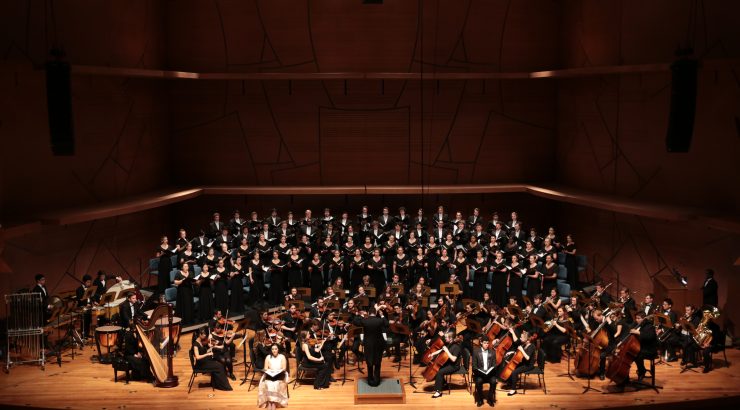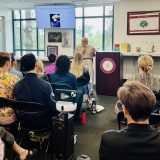
Sholund Scholarship Concert presents “Carmina Burana” Hall-Musco Conservatory of Music's season finale features Carl Orff's choral masterpiece
May 6, 2019
On Saturday, May 11, the Hall-Musco Conservatory of Music’s 45th Annual Sholund Scholarship Concert* presents Carmina Burana by Carl Orff, at 4 p.m. in Musco Center for the Arts. The concert features over 165 instrumental and choral artists from The Chapman Orchestra and Chapman Choirs, including three alumni guest-soloists. Tickets are $20 general admission; $15 senior citizens, alumni, and non-Chapman students; $10 Chapman students, faculty, and staff. To order, CLICK HERE.
Read more about the program:
Regarding major choral-orchestral works performed in the United States, arguably only Handel’s Messiah receives more performances than the venerable Carmina Burana of Carl Orff (1895–1982). From its sensation-causing Frankfurt premiere in 1937, this “scenic cantata” for three soloists, mixed chorus, children’s chorus, and large orchestra has never waned in popularity due to its almost elemental appeal to the masses. A masterful orchestrator, Orff’s “primitive” style used in this hour-long work features a great variety of instrumental and vocal colors as well as a visceral intensity of rhythm and drive, in no small part made possible by an expanded percussion battery that includes five timpani (sometimes played by two people), three glockenspiels, two pianos and celesta, and smaller instruments ranging from castanets to sleigh bells. The composer also pushes the envelope in the vocal realm as well: the workhorse baritone soloist is assigned numerous dramatic passages that call for almost prayer-like chants, pounding declamations, glissandi, florid singing, and falsetto usage; each of the three soloists is called upon to demonstrate freakishly high range; and the chorus is called upon to deliver an extraordinary amount of text and to explore their upper ranges as well (choral sopranos and tenors are given high C’s at the end of the “Spring” section).
In 1935, Carl Orff became aware of a large collection of ancient poetry of the “Goliards” that was discovered in 1803 in a monastery at Benediktbeuern, Germany and was later published as Songs of Beuern or, in Latin, Carmina Burana. Goliards were wandering bands of poor but well-educated poet/musicians, academics, defrocked priests, minstrels, and yes, university students, etc., whose secular writings (mostly in medieval Latin and Middle High German) ranged from fine love poetry to bawdy ditties and biting satires, from lauding the beauty of nature (and, of course, women) to crudely extolling the joys of drinking, gambling, and general carousing. Orff embraced this unusual body of literature for its simplicity and directness as well as its repetitive forms. From this collection of 254 poems from the 11th–13th centuries, Orff chose two dozen for his purposes.
In several distinct sections, the work opens with a pair of pessimistic ruminations on Fate followed by eight movements that form a “scene” of Spring. Here, the work’s former gloominess disappears in favor of paeans to nature—the sun, breezes, and blooming flowers and forests. Following an orchestral dance, the next multi-movement scene, the rowdy “In the Tavern,” features the tenors and basses (including soloists) in roles of angry cynics, jabbering drunkards, leaders and congregants of the “church of gambling,” and a dying roasted swan that has been cooked on a rotating spit and offered up to be eaten.
Aspects of love from the point of view of both a woman and a man form the next major portion of the work, “The Court of Love.” It consists of a captivating group of colorful movements—both beautiful and boisterous—that deals with rewarded love, love unrequited, and the anticipation and absence of love. Following is the resplendent hymn-like “Ave formosissima” whose monumental climax leads to the crashing chords of the cantata’s famous opening movement. Orff has framed his unique work with the churning, boiling strains of the inescapable, unpredictable wheel of Fate: “Fate is against me…[I am] always enslaved…everyone weep with me!”
—Program notes by Stephen Coker, DMA
* One hundred percent of your ticket price for this event is donated directly to the Sholund Scholarship Fund, benefiting students in the Hall-Musco Conservatory of Music. To enhance your contribution to the Fund, please visit our SUPPORT PAGE.
